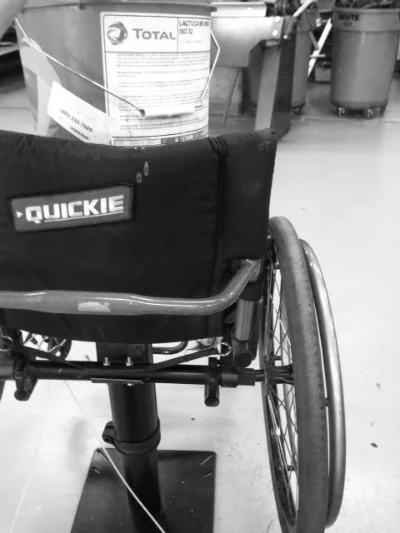It's been a whirlwind week! We've been on the phone with customer service reps trying to locate lost pneumatic cylinders, learning the basics of digital marketing and online ads, and also making plenty of phone calls trying to understand more about the insurance reimbursement process for wheelchair accessories.
Levaté is Mobile
There is some good news to report on the prototyping! Take a look at the pictures below of Ethan operating the lift with 125lbs of weight on top. It's using small pneumatic cylinders of 0.5 inch diameter that can support less weight but are cheap and quick to prototype with. Also, notice that the lift is connected to an air tank- a paintball air tank actually- so the lift is mobile as well!
The .5 inch bore cylinders lifting 125lbs. of weight, powered by a paintball air tank compressed to 3000psi.
Today and tomorrow we'll be working on using the new, thicker cylinders we just bought to build a prototype that can lift our full 300lb. goal.
That part of the prototyping was a bit delayed, unfortunately. We overnight ordered two 2.5 inch bore, 6 inch stroke pneumatic cylinders. They should have arrived last Thursday morning. The package finally came in on Friday, but with only 1 cylinder! A call to customer service confirmed that a mistake had been made in their shipping, and we received the second cylinder on Saturday. It set our prototyping back a few days, though I will say that Sherry, the woman we spoke to at the Industrial Supply store who was managing our order, was incredibly helpful and apologetic throughout the entire process.
One of two cylinders which we'll be attaching together in "piggyback" orientation, to operate in opposite directions and thus get double the lift of a single cylinder.
Facebook Advertisements
Last week, we signed up to run a series of four facebook ads to understand 1) what sort of engagement and response could we expect from such ads; and 2) what content in the facebook ads would be most effective. After four days of ads, a reach of 17,000 facebook users, and $70 total spent, we have some interesting results.
For the sake of semplicity, let's say we had 2 ads, with written messages (limited to about 150 characters), codenamed ads 1 & 2.
When a facebook user saw ad 1, they either saw picture A or B, but not both. Ad 2 on the other hand, demonstrated either picture B or picture C to users. This way, we could tell not only which ad text message was more effective by comparing the engagement results across picture B, but also which pictures were more effective, by comparing specifically those within the Ad 1 and Ad 2 messages.
Here are the results:
- Ad message 1 with picture A had 39 website clicks and 10 post likes, with a click-through rate of 3.3%. The click through rate is how many people out of a hundred actually clicked on the ad. It reached 1400 people.
- Ad message 1 with picture B had 10 likes, 2 shares, and 24 clicks, and had a click-through rate of 2.3%. It reached about 2000 people.
- Ad message 2 with picture B had 21 clicks, 7 likes, and 2 shares, with a click-through rate of 0.8%. It reached 2300 people.
- Ad message 2 with picture C has 198 clicks, 23 likes and 8 shares, but only had a click-through rate of 1% because of its very high reach (12,000).
These results indicate that Ad message 1 is clearly superior to 2, and that picture A is superior to B & C. Here was the winning ad:
Levaté is a 12 inch lift for manual chairs for extra reach at home, the office, or a store
Insurance Industry Hassles
That just leaves the last of our tests this week to talk about, The Insurance Question, or: Can Levaté be insurance reimbursable? We had heard anecdotal evidence that power lift devices might be considered medically necessary by insurance if they were instrumental in helping the user transfer in and out of their power chair, for example. Our thoughts are that we could make a similar argument for Levaté, and we wanted to talk to a decision maker in the industry to confirm this and understand what process a wheelchair user would need to go through to get a Levaté unit reimbursed by their insurance company.
First, the good news! It looks like the process for registering a product with the Veteran's Administration (VA) is very straightforward: you go to sam.gov and complete a registration process there for the device. Once it's registered, the VA will pay for 100% of the device. The only hard part after that is generating the word-of-mouth among wheelchair users and PTs: The former so that they ask their PTs for them, and the latter so that they recommend Levaté to their patients. If a purchase is under $3,000, then it's approved immediately by the local VA hospital with a minimum of red tape.
On the other hand, it looks like both manufacturers and wheelchair users are opting out of medical reimbursement entirely.
One wheelchair accessory manufacturer explained why they opted out of trying to get their device (the FreeWheel) coded by insurance companies. The fee you pay Medicare- who sets the trends for the entire industry- is $50,000 just to begin the coding process. And there's no guarantee that the insurance code will be approved. Even if it is, you pay $8,000 annually to maintain the code and insurance providers can still deny a claim for that code if they feel there's a reason to (ie if they can save money and get away with it).
Wheelchair users are also opting out of insurance due to the hassle and 6-12 month wait. That means that a wheelchair user with a chair that's falling apart could wait up to a year from the time they file their insurance paperwork before they get their new chair, as was the case for one of the wheelchair users we spoke with a couple days ago.
Scott at Tri State Medical, a wheelchair dealer, noted that 30-40% of his customers opt out of trying to get insurance to reimburse their purchases and instead pay for their new wheelchairs out of pocket. This is even more so the case for purchases under $1,000. At $500, he said most wheelchair users won't even bother trying to get a device reimbursed by their insurance- it's just not worth it.
Clearly there are some things very wrong with the American insurance system. Until there is industry-wide reform, we can at least equip wheelchair users with the tools they need to try for insurance reimbursement of Levaté with their private insurance. Freewheel, which I mentioned above, provides instructions for wheelchair users on their website to get their doctors or PTs to prescribe their accessory in such a way that it is seen as a medical necessity and can be covered under the "Miscellaneous Wheelchair Accessory" code K0108. This may be the best workaround for those who have private insurance and can't afford Levaté on their own.
That's what the Levaté team has been up to this past week. If you have any experience with the insurance industry or reimbursement process and would like to comment on the process or what we've found so far, we'd love to hear from you! You can comment here, send an email to levatelift@gmail.com or find us on facebook and twitter.





